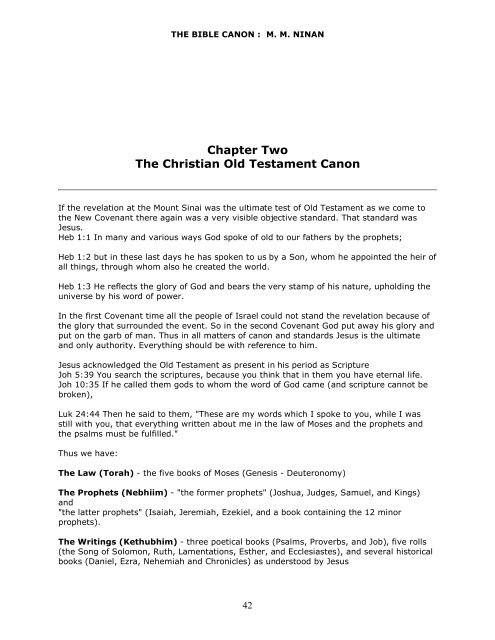Create successful ePaper yourself
Turn your PDF publications into a flip-book with our unique Google optimized e-Paper software.
THE BIBLE CANON : M. M. NINAN<br />
Chapter Two<br />
The Christian Old Testament <strong>Canon</strong><br />
If the revelation at the Mount Sinai was the ultimate test of Old Testament as we come to<br />
the New Covenant there again was a very visible objective standard. That standard was<br />
Jesus.<br />
Heb 1:1 In many and various ways God spoke of old to our fathers by the prophets;<br />
Heb 1:2 but in these last days he has spoken to us by a Son, whom he appointed the heir of<br />
all things, through whom also he created the world.<br />
Heb 1:3 He reflects the glory of God and bears the very stamp of his nature, upholding the<br />
universe by his word of power.<br />
In the first Covenant time all the people of Israel could not stand the revelation because of<br />
the glory that surrounded the event. So in the second Covenant God put away his glory and<br />
put on the garb of man. Thus in all matters of canon and standards Jesus is the ultimate<br />
and only authority. Everything should be with reference to him.<br />
Jesus acknowledged the Old Testament as present in his period as Scripture<br />
Joh 5:39 You search the scriptures, because you think that in them you have eternal life.<br />
Joh 10:35 If he called them gods to whom the word of God came (and scripture cannot be<br />
broken),<br />
Luk 24:44 Then he said to them, "These are my words which I spoke to you, while I was<br />
still with you, that everything written about me in the law of Moses and the prophets and<br />
the psalms must be fulfilled."<br />
Thus we have:<br />
The Law (Torah) - the five books of Moses (Genesis - Deuteronomy)<br />
The Prophets (Nebhiim) - "the former prophets" (Joshua, Judges, Samuel, and Kings)<br />
and<br />
"the latter prophets" (Isaiah, Jeremiah, Ezekiel, and a book containing the 12 minor<br />
prophets).<br />
The Writings (Kethubhim) - three poetical books (Psalms, Proverbs, and Job), five rolls<br />
(the Song of Solomon, Ruth, Lamentations, Esther, and Ecclesiastes), and several historical<br />
books (Daniel, Ezra, Nehemiah and Chronicles) as understood by Jesus<br />
42


















